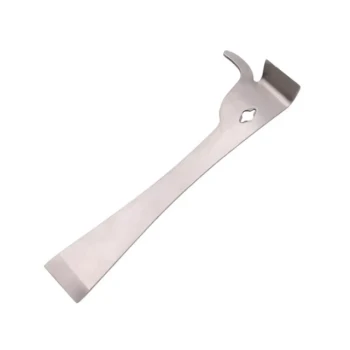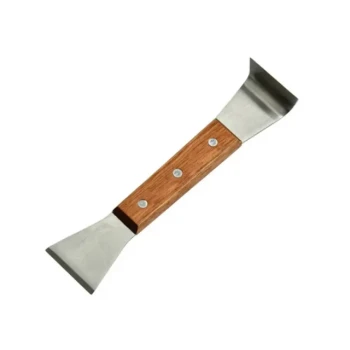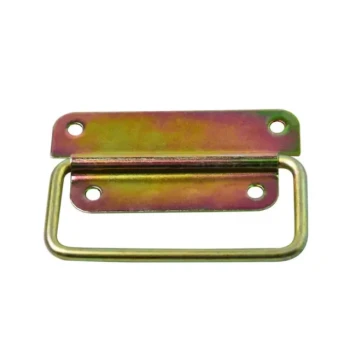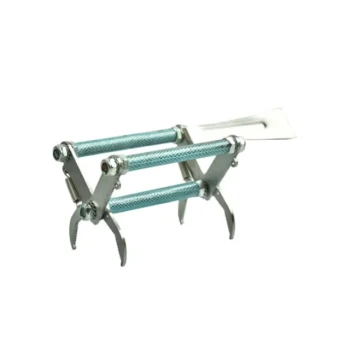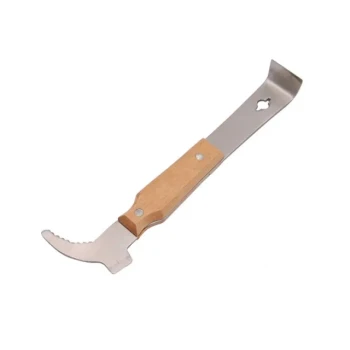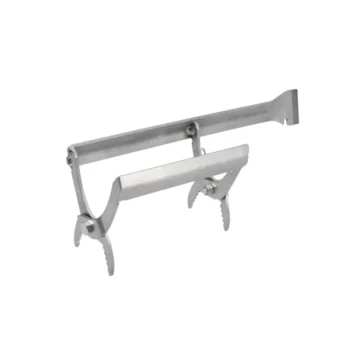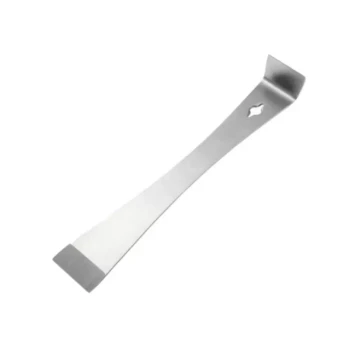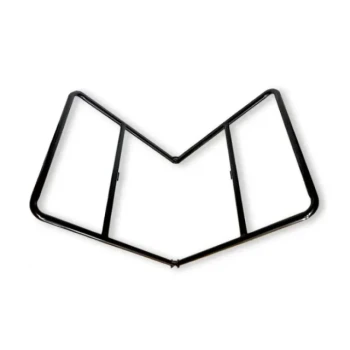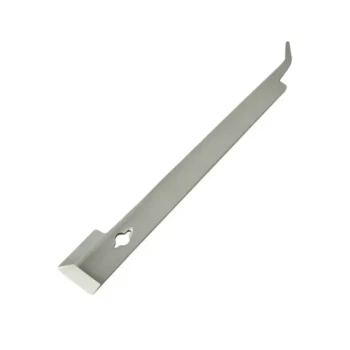To start beekeeping, you need four essential categories of equipment: a hive to house the bees, protective gear for your safety, basic tools for managing the colony, and a source for your bees. These core components are the absolute minimum required to establish and care for your first colony successfully.
The most common mistake for new beekeepers is over-investing in equipment too early. Focus first on the essentials for establishing a healthy hive—the hive itself, protective gear, and basic tools—and defer purchasing honey-harvesting equipment until your colony is strong and productive.
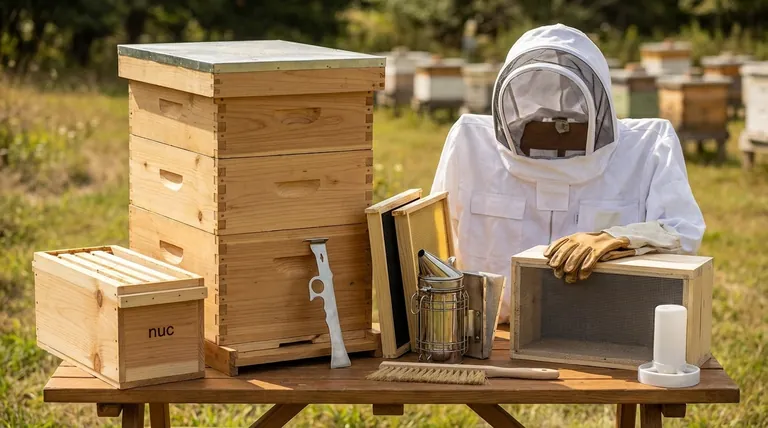
The Core Components of Your Apiary
A successful start in beekeeping depends on having the right foundation. This means assembling the non-negotiable items your bees need to thrive and you need to work safely and confidently.
The Hive: Your Bees' Home
The hive is the structure where your colony will live, raise young, and store food. Most beginners start with a standard Langstroth hive, which is a system of stackable, modular boxes.
You can purchase these as a hive kit, which is highly recommended for beginners as it ensures all parts are compatible. These kits typically include a bottom board, one or two deep hive bodies for the brood chamber, several medium "honey supers," frames, an inner cover, and an outer cover.
Protective Gear: Your Personal Safety
Working with bees requires confidence, and confidence comes from feeling safe. Do not skip or minimize your investment in quality protective gear.
The essentials include a beekeeping suit or jacket, a veil to protect your face and head, and gloves. This gear protects you from stings and allows you to perform hive inspections calmly and deliberately.
Essential Tools: Managing the Colony
You only need a few simple tools for routine hive inspections and management.
A hive tool is a small, specialized crowbar used to pry apart hive components, which bees seal together with propolis. A smoker is used to puff cool smoke into the hive, which helps calm the bees. Finally, a bee brush is used to gently move bees off frames without harming them.
Sourcing Your First Colony
Once your equipment is ready, you need bees. There are three common ways to acquire your first colony.
Bee Packages vs. Nucleus Colonies
A package of bees is essentially a box containing a queen and several thousand worker bees without any established comb. A nucleus colony (nuc) is a small, functioning starter hive, complete with a laying queen, workers, and frames of comb containing brood, honey, and pollen.
Nucs are often easier for beginners as they provide the bees with a significant head start. You can also sometimes catch a swarm of wild bees, though this is a less predictable method.
Common Pitfalls and Key Considerations
Knowing what not to do is as important as knowing what to do. Avoiding these common mistakes will save you time, money, and frustration.
The Mistake of Buying Everything at Once
It is tempting to buy honey extractors, bottling equipment, and other harvesting tools right away. Resist this urge. Your first year is about learning and helping your colony become established. A new colony may not produce a surplus of honey in its first season, making this equipment an unnecessary upfront cost.
The Importance of Timing and Preparation
Purchase and assemble your hive components well before your bees are scheduled to arrive. This gives you ample time to build and paint the woodenware, which protects it from the elements.
However, do not install the wax foundation into the frames until just before you need them. If stored improperly, particularly in warm temperatures, the thin wax sheets can warp and stretch, making them unusable.
The Value of Mentorship
The best piece of "equipment" is often an experienced mentor. As a novice, seek help from local beekeepers or join a beekeeping association. An expert eye can be invaluable when assembling your first hive or performing your first inspection.
Making the Right Choice for Your Goal
Your path into beekeeping can be tailored to your budget and desired level of convenience.
- If your primary focus is starting with the absolute minimum: Prioritize a single hive kit, a jacket with a veil, gloves, a hive tool, and a smoker.
- If your primary focus is a smooth, worry-free start: Purchase a complete beginner's kit that includes all essential gear, and source a nucleus colony (nuc) instead of a package for a stronger start.
Ultimately, your goal in the first year is not honey production, but learning the rhythms of the colony and guiding it to a healthy, established state.
Summary Table:
| Essential Equipment Category | Key Items | Purpose |
|---|---|---|
| The Hive | Langstroth Hive Kit (boxes, frames, covers) | Provides a home for the colony to live and store food. |
| Protective Gear | Suit/Jacket, Veil, Gloves | Ensures your safety and confidence during hive inspections. |
| Basic Tools | Hive Tool, Smoker, Bee Brush | Allows for routine hive management and bee handling. |
| Bee Sourcing | Nucleus Colony (Nuc) or Bee Package | Establishes your first colony of bees. |
Ready to equip your apiary with confidence?
As a trusted wholesale supplier for commercial apiaries and distributors, HONESTBEE provides durable, high-quality beekeeping equipment designed for success. Let us help you build a strong foundation for your beekeeping operation.
Contact HONESTBEE today to discuss your equipment needs and wholesale pricing.
Visual Guide
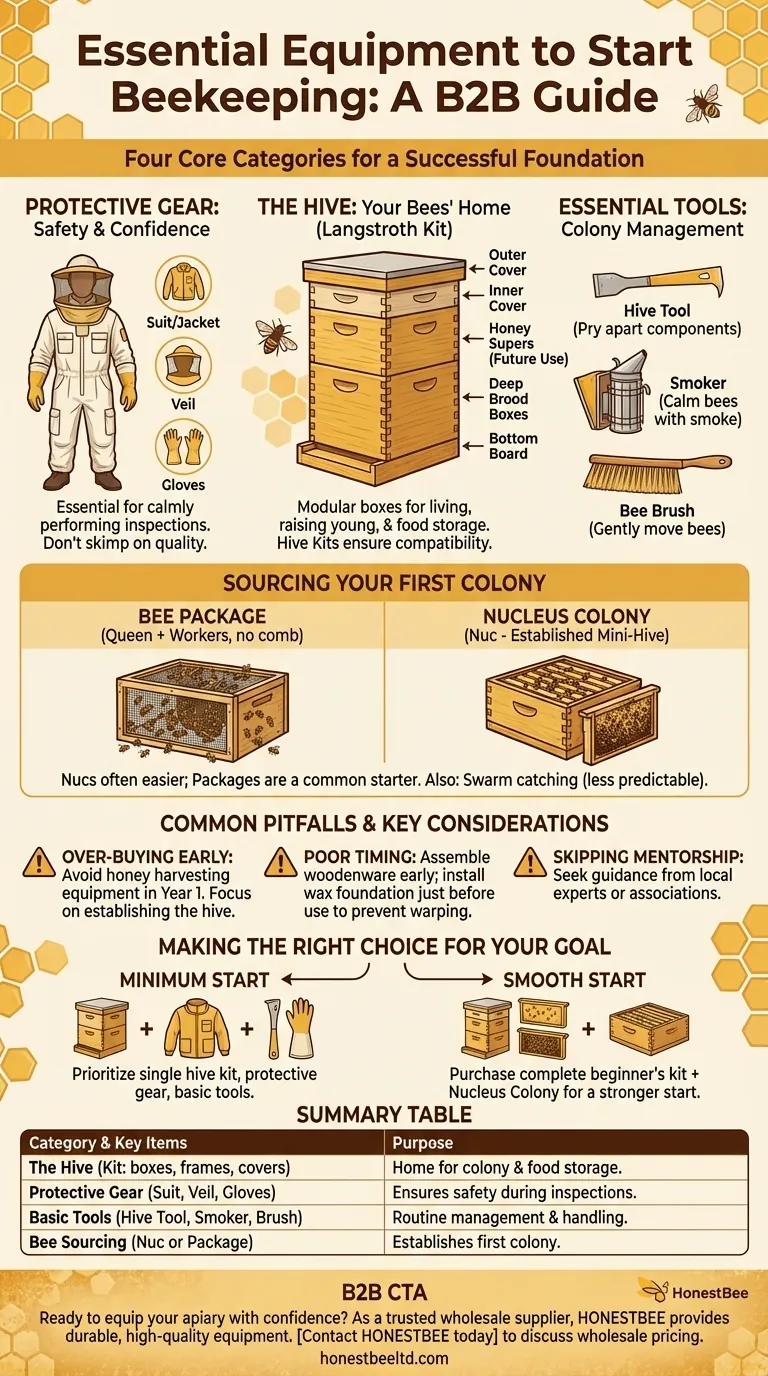
Related Products
- HONESTBEE Advanced Ergonomic Stainless Steel Hive Tool for Beekeeping
- HONESTBEE Professional Long Handled Hive Tool with Precision Cutting Blade
- Professional Multi-Function Stainless Steel Hive Tool
- Professional Dual-End Stainless Steel Hive Tool for Beekeeping
- Wholesales Dadant Size Wooden Bee Hives for Beekeeping
People Also Ask
- Which hive components are most effective for optimizing ventilation during summer beekeeping? Boost Colony Health
- How can beekeeping gear be maintained to extend its lifespan? A Guide to Proactive Equipment Care
- Is it necessary to cool the hive during cooler summer nights? Trust Your Bees' Natural Thermoregulation
- How does a Bee Floral Calendar function in commercial apiary operations? Optimize Your Honey Harvest Strategy
- Why are professional beekeeping facilities necessary for sustainable forest honey production? Boost Yields & Stability
- Why does honey crystallize? The natural science behind raw honey's texture
- How do professional protective and collection equipment contribute to pollination? Scale Your Apiary Efficiency
- How are hygrometers, thermometers, and lux meters used in apiaries? Key Tools for Bee Environmental Stress Analysis


